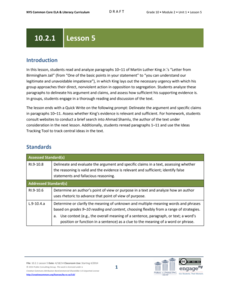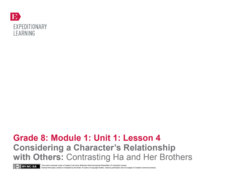Curated OER
Alphabet Soup Job Descriptions
Eleventh graders investigate New Deal programs. In this Great Depression lesson, 11th graders read the provided source materials that detail the agendas of 3 New Deal agencies. Students complete the provided analysis sheets and then...
Curated OER
McMUN Model United Nations
If you have been searching for a plan to run a model U.N. simulation, this plan provides some bare bones for your lesson. Scholars break into blocs to research and discuss global issues and come up with collaborative solutions. In their...
Curated OER
Influencing the Agenda: The Impact of Interest Groups on Public Policy
Young scholars define the terms "interest groups" and "public policy". In groups, they discuss the ways in which interest groups can have an effect on how a Board member votes. Using examples, they discover the effectiveness of...
Curated OER
Operation Iraqi freedom
Young scholars explain the term "public agenda' and identify the characteristics and components of the media. They read newspapers, watch and listen to newscasts to determine the media's position on the war in Iraq.
Curated OER
Religions
Students study different religions and factions within the religion. They examine the political agenda of religious factions in civil war zones in Africa, Asia, or Latin America. They investigate high crimes against humanity in the name...
Curated OER
THE MASSACHUSETSS FRONTIER:TURNER
Learners examine the political, social, religious, and economic world and national context in which the settlement of Deerfield occurred and the competing political agendas, and competition for land, power, and wealth in Deerfield.
Curated OER
Putting a Spin on Current Events
Students explore the artistic value of propaganda. In this visual arts lesson, students analyze antique artistic pieces for their political agenda perpetuation. Students discuss propaganda techniques of the past to today prior to...
Overcoming Obstacles
Taking Tests
In a lesson designed to prepare scholars for taking tests, they begin with a review of how to plan and review notes. They Identify ways to prepare for upcoming tests and strategies for studying and memorizing information. Class...
US Environmental Protection Agency
A Mock Town Meeting on a Proposed Tank Farm
Intended as a follow up to the Protecting Your Drinking Water activity, young environmentalists use their assessment of the a hypothetical town's water supply to debate the installation of underground chemical storage tanks. With...
PBIS World
Efficient Functional Behavior Assessment Checklist
Work on a learner's problem behavior in your classroom with a behavior assessment checklist. After identifying the behavior, educators can indicate how often the behavior occurs, any events that could cause or encourage the...
Maryland Department of Education
The Concept of Diversity in World Literature Lesson 13: Unit Culmination - Symposium
To conclude a unit on the concept of diversity in world literature, class members conduct a symposium on "African Literature in Global Perspectives." In order to earn a spot on the panel, individuals craft an original thesis that...
Missouri Department of Elementary
The Successful Student: Let’s Review for Better Achievement
Study skills, time management skills, and test taking-skills are important attributes for both the classroom and the real world. Focus on these learning skills in a instructional activity that reviews how to be a good student and...
EngageNY
Grade 10 ELA Module 2: Unit 1, Lesson 5
People should always choose their words carefully. Scholars examine the words used by Martin Luther King, Jr. in paragraphs 10 and 11 of his "Letter from Birmingham Jail." Readers answer questions about word use, think about synonyms,...
EngageNY
Considering a Character’s Relationship with Others: Contrasting Ha and Her Brothers
Who is Ha? Scholars look closely at the poem Papaya Tree and carefully examine the character Ha. Learners work in groups to create an anchor chart defining Ha's character. They also answer text-dependent questions to help with...
EngageNY
Launching Researching: Reading for Gist and Gathering Evidence Using the Research Guide
Let's get to the gist! Pupils work in research teams to gather information about specific refugee experiences from Bosnia, Afghanistan, and Kurdistan. Scholars then try to find the gist of informational texts about their topics,...
EngageNY
Comparing Meaning and Tone: The Fall of Saigon in Fiction and Informational Text
Who's that talking to? Readers listen to a reading of the "Forgotten Ship" transcript and answer questions focusing on word meaning and choice. They complete a chart to track the multiple narrators in the script. For homework, readers...
EngageNY
Analyzing the Author’s Perspective: “Equal Rights for Women” by Shirley Chisholm
It's all about perspective. Scholars talk about the meaning of perspective and look closely at the point of view of Equal Rights for Women. They discuss how Chisholm addresses the views of others and complete a close reading guide to...
EngageNY
Analyzing How Literature Draws on Themes from the Bible and World Religions: The Golden rule (Chapter 3)
Scholars use their Golden Rule Note-catcher to examine passages from To Kill a Mockingbird. They then take a gallery walk to compare and contrast the quotes before sharing Think-Write-Pair-Share ideas on how the quotes demonstrate the...
EngageNY
Finishing Who? Where? and Why? Research
Who? Where? Why? Scholars answer these questions to help identify the gist of Inside Out & Back Again. First, they add text evidence to their research folders. They then begin looking at a performance task in which they write their...
EngageNY
Comparing Text Structures: To Kill a Mockingbird and “Those Winter Sundays” (Chapter 6 and 7)
Scholars carry out a close read of the poem "Those Winter Sundays" to determine its point. They look at the words used and the structure of the stanzas and then compare the poem's narrative structure to chapter 6 of To Kill a...
EngageNY
Jigsaw to Analyze Mood and Tone in To Kill a Mockingbird (Chapter 8)
We have an appointment! Scholars meet with another discussion appointment to discuss the text structure of the poem "Incident" by Countee Cullen. They use a Note Catcher to guide their thinking and compare the structure to chapter 8 of...
EngageNY
Examining How Word Choice Contributes to Tone and Meaning: Close Reading of “Wet and Crying”
Scholars participate in a Write-Pair-Share activity while answering questions about the meaning of words in "Wet and Crying." They use their Write-Pair-Share note-catchers to guide their thoughts and then share with the class. After...
EngageNY
Peer Critique of “Inside Out” and “Back Again” Poems
Class members closely examine the use of words in the poems "Inside Out" and "Back Again" to determine if different words would create more powerful poetry. They then conduct peer reviews of the poems they created and offer suggestions...
EngageNY
Text to Film Comparison: Taking a Stand at the Jailhouse (Chapters 14-15)
Readers look closely at Scout in chapter 15 of To Kill A Mockingbird. Learners use turn and talk and Analyzing Scout's and the Reader's Perspectives Note-catcher to compare their perspectives to Scout's. They then make a comparison to...
Other popular searches
- Time Management Daily Agenda
- Congressional Agenda
- Time Management Dialy Agenda
- Sample Open House Agenda
- Open House Agenda
- Agenda for Meeting
- Agenda 21
- Pictorial Agenda
- Government's Agenda
- Media's Agenda
- Political Agendas
- Using an Agenda























